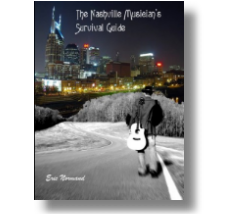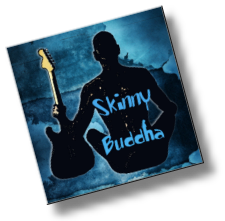
I was talking to a college student a while back who said he was interested in becoming a tour manager. It turns out that one of his best friends is an aspiring young artist with a bright future, one who will likely need a tour manager someday. “What does a tour manager do?” he asked. The specific duties can vary depending on the tour, but in general, the tour manager oversees all aspects of the touring entourage and coordinates each concert with the event buyer, production company, and all other pertinent parties. My job as tour manager for Rhett Akins requires me to wear a lot of hats; tour manager, band leader, lead guitarist – officially; and guitar tech, stage manager, assistant merch person, travel agent, part-time bartender, and occasional guidance counselor – unofficially. There are eight members of our entourage – Rhett, myself, three other band members, a sound engineer, a merch person, and a bus driver, and it is my job to make sure they are well taken care of when we are touring. To give some perspective, I thought it might be fun to take you on a recent one off with Rhett and gang. This post will be a bit long, but then again so is the day of a tour manager.
Rhett Akins
09-04-10 – Clay County Days Festival – Manchester Kentucky
It was about 11:30 PM on Friday, September 3rd when Kelly and I arrive to the bus near Opryland in Nashville, TN. Most of the other guys are already there and our sound engineer, Mike Jaeger, and bassist, Clint Jacobs, help me load my gear , Rhett’s merch, and some bus stock into the bays underneath the bus. Assistant tour manager and merch specialist, Kelly Normand, begins stocking the refrigerator with bottled waters and putting away some of the other supplies (paper plates, solo cups, etc.). On this run we have a substitute driver, and after making his acquaintance, I give him some paperwork and discuss some specifics of the trip. A little while later we pull out, bound for London, KY, the location of the hotel we would be using for our show at Rawlings Stinson Park in Manchester Kentucky. My official duties complete for this workday, I enjoy some chill time in the front lounge with the guys for a bit before heading to bed (or heading to bunk, rather).
Like most of our weekend runs, our bus arrives to a hotel parking lot sometime early morning and I awake a few hours later to begin my day. My first duty is getting checked into our hotel rooms, and this can require a special skill set (called charm) to get into these rooms at the early hour of 9 AM (most hotel check-in’s are between 1 and 3 PM). After offering a warm greeting to the hotel front desk clerk, I introduce myself – “My name is Eric Normand, I’m the tour manager for Rhett Akins and we’ve got four rooms booked with you. I realize it’s still kind of early, but I was wondering if any of them are ready.” “We should have a couple of rooms cleaned and ready in about 20 minutes and the other two in about an hour” she notifies me. “Great, thanks.” I return to the bus and eat some breakfast before returning to the hotel lobby for the room keys.
By noon, most everyone is up and hanging out in the front lounge. Were watching “Stand by Me” on the flatscreen TV as we head off for the venue, a 20 mile, 30 minute drive. While enroute I call my contact at the event to notify him we are almost there. We arrive on site and back the bus into a fire station parking lot across the street from the park. This is the closest the bus will be able to get to the stage which is located about an eighth of a mile away, and I quickly realize I’m going to get in a fair amount of walking on this sunny 70° day. I walk off the bus and meet, Gene, my go-to guy from this event for the day. “Tell me what you guys need, and I make it happen.” he informs me. “Everybody’s pretty hungry, so the bus stock would be great. After that we’ll need a pickup truck and some stagehands to cart the gear over the stage, and a runner to take our driver back to the hotel.” A few minutes later our bus stock is arriving, and I began to coordinate the load in.
After everybody eats, I find the runner who then takes our driver back to the hotel to sleep, and we begin our set up and sound check. As I still have a lot of details to tend to, I try to set up my gear as quickly as possible. Before I can finish, the event buyer requests a brief meeting with Rhett, as well as the handling of settlement (payment). Gene takes me via golf cart back to the bus so we can bring Rhett to meet the owner who is down the street cooking our BBQ dinner on a giant smoker. A little while later I’m back to the stage with sound check in full swing. Mike has done a good job of ‘ringing out the monitors’ and we are pretty much ready for Rhett. After running through two songs and making a few minor adjustments everybody’s pretty happy with the sound, so we ‘spike and strike’ our monitors and pedal boards to make room for the opening act.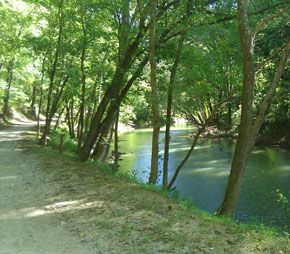
Typically, the conclusion of sound check would mean that we’re all returning to hotel rooms for showers, but as this day had a late afternoon sound check with an early show time, there wasn’t enough time. I told everyone this in advance, and most of them had already taken a quick shower late morning at the hotel. So today, it’s a couple hours of downtime on-site. Some of the guys go walking around the festival for a bit, others hang out on the bus watching college football, while Kelly and I explore a walking trail off the back side of the park. Dinner was served in the firehouse at five o’clock – a massive spread of pulled pork, ribs, potato salad, and some outstanding homemade creamed corn. In fact, the creamed corn tastes so much like corn, that I realize how little so many other ‘corn products’ actually taste like corn.
After dinner it’s time to set up our merch station, so I accompany Kelly to her tent to make sure she has everything she needs. Upon our arrival to her side stage location, I see that the event has provided a 10×10 pop-up tent, table, and a half a dozen folding chairs. While Kelly begins setting up her merch, I find one of the production company workers and ask him to run some power over to the tent for lighting. Once the lighting is set I begin preparing for Rhett’s meet and greet by texting him to notify him that it’s 10 minutes out. I verify with Gene that the meet and greet party has gathered, and deliver Rhett, sharpie in hand, to the green room. During the middle of this autograph-signing photo-op I get a text from Kelly stating that she needs more change and that one of her lights has a burned-out bulb. I locate a spare bulb and $100 worth of 5’s, make another walk to the stage area, and return to help wrap up the meet and greet.
I escort Rhett back to the bus, put a fresh battery in his in-ear wireless belt pack, and return to the stage to reset my gear. The opening band now finished and the stage clear, I place my pedal board, tune my guitar, and check my rig with a few quick power chords. I continue on to Rhett’s position, tuning his acoustic and checking it for signal, checking his vocal mic in the monitors and in the house, installing a pic clip with guitar pics to his mic stand, and placing set lists and a beverage on the stage floor by his monitor. The other band members are all at their stations checking their rigs, and a DJ is selling himself over the mic in that nonstop annoying ramble that only a DJ can do. The park is filled to capacity, somewhere around 4000, and we’re ready to go. I make one more walk back to the bus to shuttle Rhett over via golf cart. A few minutes later and were off and sailing on our 90 minute ‘countrified’ rockathon.
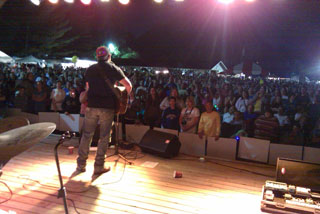 In a day so full of endless details, the nightly concert is by far the high point for me. For these 90 minutes I get to play my guitar with a great band, behind a great front man, and it’s all about the music for me. Rhett, being the quintessential performer, possesses the uncanny ability to render a crowd in the palm of his hands in about as much time as it takes him to walk out onto the stage. The concertgoers on this particular night are no exception to this rule, and Rhett quickly wins them over. For this brief period, it doesn’t even seem like I’m working, after all, this is what I set out to do in the first place. Aside from our usual repertoire, one standout is an impromptu performance of Bon Jovi’s ‘Wanted Dead or Alive’ (playing in all those early cover bands sure comes in handy every once in a while) and Rhett’s son, Thomas Rhett, joining us to sing a great rendition of ‘Duck Blind’. 90 minutes later our performance is complete, and the captive audience slowly makes their retreat as Rhett rides back to the bus via golf cart while the band tears down the gear. I quickly transition from musician mindset back to road manager and instruct Gene to pull up a truck next to the stage for load out. We load the gear, ride over to the bus, and load it into the bays. I send the runner to pickup our driver, they return about an hour later, and we fire up the bus to ride off into the night. My workday done, I enjoy a frosty beverage in the front lounge with the gang. I awake on the bus the next morning back in Nashville, load my car, and get the fuel receipts and some other paperwork from the bus driver. “Great job everybody, see you next week!”
In a day so full of endless details, the nightly concert is by far the high point for me. For these 90 minutes I get to play my guitar with a great band, behind a great front man, and it’s all about the music for me. Rhett, being the quintessential performer, possesses the uncanny ability to render a crowd in the palm of his hands in about as much time as it takes him to walk out onto the stage. The concertgoers on this particular night are no exception to this rule, and Rhett quickly wins them over. For this brief period, it doesn’t even seem like I’m working, after all, this is what I set out to do in the first place. Aside from our usual repertoire, one standout is an impromptu performance of Bon Jovi’s ‘Wanted Dead or Alive’ (playing in all those early cover bands sure comes in handy every once in a while) and Rhett’s son, Thomas Rhett, joining us to sing a great rendition of ‘Duck Blind’. 90 minutes later our performance is complete, and the captive audience slowly makes their retreat as Rhett rides back to the bus via golf cart while the band tears down the gear. I quickly transition from musician mindset back to road manager and instruct Gene to pull up a truck next to the stage for load out. We load the gear, ride over to the bus, and load it into the bays. I send the runner to pickup our driver, they return about an hour later, and we fire up the bus to ride off into the night. My workday done, I enjoy a frosty beverage in the front lounge with the gang. I awake on the bus the next morning back in Nashville, load my car, and get the fuel receipts and some other paperwork from the bus driver. “Great job everybody, see you next week!”
This one-off is typical for a small to midsized tour, such as ours. On tours of this size and nature, the tour manager advances these details over the days and weeks preceding the show (quite often it is these advance phone calls and e-mails that make or break how well each show day and show goes). In the days after a weekend run, the tour manager addresses payroll, bank deposits, bus lease payment, and some light accounting duties while advancing upcoming shows. On a larger more active tour, there would simply be more tour members, more tour buses, and more equipment, and they would likely be staying out for longer periods of time. A day similar to the one I just described would be repeated in succession, kind of like Groundhog Day, each day beginning the same as the last – the view of an obscure parking lot from the bus window, somewhere far from home. On one of these tours, the ‘TM’ would still be the grand overseer, but would be delegating many of these roles to others – stage managers, guitar techs, etc. He still has to deal with all the same kinds of details, he just doesn’t have to wear as many hats. Don’t get me wrong, I’m not complaining about wearing so many hats, he probably doesn’t get to play guitar during the show.
My name is Eric Normand and welcome to ‘Country Concerts’!
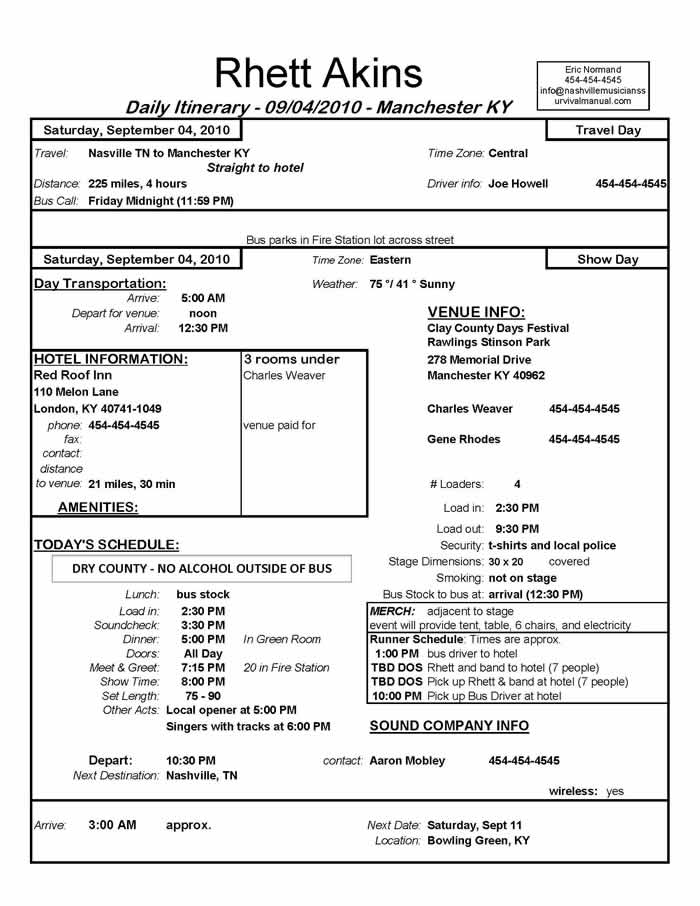
In my blog yesterday I asked for your questions about Nashville, and received several good ones in the comments section and on my Facebook page. So I decided to put them all together with my answers in today’s blog. Here’s what I know about what y’all wanted to know.
Who do I need to meet and where to hang out to get exposure as a musician?
This is one of the biggest questions people ask. There is no short easy answer either. That question and the answers to it are essentially what my book project is all about. Here are the short answers:
“Who do I need to meet to gain exposure as a musician?”
Everyone in the music community that you possibly can! With each musician or music entrepreneur you meet comes a whole new set of possibilities. You never know where each new road might lead. Keep in mind that the identity of many musicians and industry professionals won’t always be obvious either. You could be standing in line at the supermarket next to a record producer and not even know it. Somebody that looks like a homeless person in a bar could be a hit songwriter. And of course, just meeting these people is only a first step. Most people that become successful in this business do so by slowly nurturing relationships over a long period of time.
“Where do you need to hang out to gain exposure as a musician?”
In Nashville, the face-to-face meeting of musicians in nightclubs and music venues around the city still works best. You can’t go wrong by making the rounds at the clubs on Broadway, Music Row, the Fiddle and Steel, the Bluebird Café and the Commodore Lounge for songwriters, etc.
In this day and age a lot can be accomplished via the Internet as well. I have made some amazing contacts for my book project just by sending e-mails to industry people I found on websites or Google searches. With this approach I have had correspondence with Derek Sivers (founder of CD baby), a music business professor at the University of Miami, etc. The Internet can enhance your visibility as a musician or performer but should not replace face-to-face encounters in public.
Where are the Nice Southern Gentlemen?
I’m not sure what you’re looking for exactly. But I would say that most men that live in the South are somewhat ‘gentlemanlike’ (you know that whole Southern hospitality thing). It even wears off on some of us northern transplants eventually!
I’m wondering if it would be a good place to put some of my uncle’s shows. They’re all cabaret style shows. Most music based.
Nashville might be a good place for that kind of show, but then again it might not be. It all depends on whether or not he has a draw here. There are many decent music venues in Nashville, so if he has built a big enough fan base, via touring and/or the Internet, he might do okay. But if he’s not known in this region he will have a hard time drawing a crowd, and the local Nashville venues won’t pay much to an unknown act. He might want to consider trying Branson, Missouri, as that city is more known for these types of shows. Of course, they will expect him to draw as well.
Favorite Restaurant?
Generally speaking, I make it a point to never eat in restaurants, as restaurant food is generally unhealthy. But there are plenty of popular restaurants here for those who do enjoy them. This 2009 article from the Nashville scene ‘Best of Nashville 2009: Food and Drink’ outlines some of the city’s most popular places.
Personally, I would recommend buying some good healthy ingredients at Whole Foods (either at Green Hills, or in Franklin), and cooking a great meal at home. You can find some great recipes on a site called Do It the Hard Way.
What songs do you need to know if you want to jam at Fiddle and Steel?
To be prepared to sit in at the Fiddle and Steel, or any other similar bar in Nashville for that matter, knowing what I call ‘The Nashville 100’ is essential. The Nashville 100 is a list I have comprised of what I have found to be the most commonly covered standards played in Nashville. The list is posted on the Survival Guide site, follow this link to view it http://nashvillemusicianssurvivalmanual.com/list.html. While these aren’t the only songs that might be played, knowing these songs will give you a lot of common ground with most players in town.
Best places to live? I hear a lot about east Nashville, so that must mean its over-crowded with wanna-be hipsters. Any other cool neighborhoods off the radar and reasonably priced?
The neighborhoods in east Nashville can vary greatly. There are some decent areas and some rough spots as well, but apartment rentals in that area are generally affordable. The same thing could be said about many parts of the city. Reasonably priced apartments ($600 – $750 for a single bedroom) can be found in Belmont, Bellevue, Donelson, Gallatin, and many other outlying communities.
The desirability of an area could also be determined by whether or not you will have children living with you (ie quality of school systems, crime rates, etc.), and if you will be commuting in and out of the city during daytime hours (East and North of the city generally have the worst traffic backups).
What kind of gear should a guitar player have for studio gigs vs touring gigs?
Many of the successful Nashville based session guitarists have rigs consisting of multiple guitars; Teles, Strats, Gibsons, PRS etc., multiple heads; Class A style head (Matchless, Dr. Z, etc.), Marshall style head, and maybe a Fender style head, and a refrigerator rack full of effects with some type of pedal board set up as well. This kind of setup would be more typical for a full time A list session player. There are plenty of players who work in the studio on much simpler rigs but still have the ability to deliver a wide range of tones. Of course there are some ‘niche’ studio players that only have one basic sound and get calls to do that one thing they do best.
As far as touring rigs go it depends on the gig. But for most country/pop/rock gigs, a Tele style guitar, Class A combo, and a pedal board with the essentials (a clean boost or compressor, overdrive, delay, and tuner) will suffice (amp and pedals in Anvil style cases). A backup guitar is always a good idea too.
How are you liking it? Bartlett St. to “oprayland”
I’m loving it! Bartlett Street in Kingston New Hampshire was a great place to grow up, but Nashville has definitely become the home of my second life. There was a bit of culture shock over the first couple of years, but I am now well adjusted. I still do miss a lot about New England – friends, family, having the ocean in my backyard, autumn foliage, summers where it’s not 100° every day for four months. But the experiences I’ve had, the people I’ve met, the places I’ve been, the skills I’ve gained, I wouldn’t trade it for the world!
Thanks again everybody for your participation in my informal survey, it definitely gave me a lot of perspective. Many of these questions are answered in much greater detail in my book project which is still in the works, but some of them are bringing up points I wasn’t already thinking of. Ultimately, some of these new points will also be addressed in the book.
For those of you that haven’t yet fully explored this site, you will find that some of these questions are addressed in more detail within it. I’m thrilled with the response I got to my query and urge you to ask more questions if you have them, preferably in the comments section of these blogs. Thanks again and happy reading!
Nashville is a destination for people from all over the world, and those considering relocation to Music City often post questions on the Nashville craigslist and other message boards about what it’s like to live and work here. While my website and soon to be completed book ‘The Nashville Musician’s Survival Guide’ serve to answer these kinds of questions, your input is badly needed.
In the spirit of providing the information that you are looking for the most, I would like to conduct a kind of informal survey.
I want to know what you want to know about Nashville. What you want to know about living here, working here, becoming involved in the music community, the climate, the culture – you name it.
If I know the answer, I’ll post my thoughts and feedback. If I don’t know the answer, I’ll research it and post my results.
In the true spirit of perpetuating a sense of community in a music business that often lacks it, I would like to keep this discussion public. So I urge you to post your questions as comments here on this blog rather than sending me e-mails.
Your questions and thoughts will help me to provide the most accurate information possible and will help many other musicians in the process. Thanks for participating!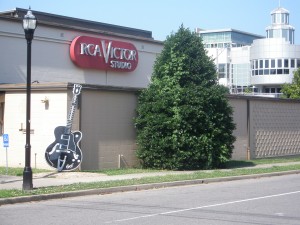
It’s about 1:00 AM and were traveling east on Interstate 40 on our leased Prevost XLII tour bus, just a little bit east of Knoxville, Tennessee on our way to Manteo, North Carolina. I’m getting kind of sleepy so I say goodnight to our bus driver, Steve and the rest of the guys and crawl into my bunk. After a while I am lulled to sleep by the soft cushy ride and steady drone of the diesel 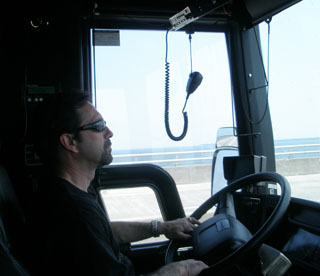 engine. Barring the occasional pothole, the sensation of this ride from the interior of my bunk is almost boat-like – more like floating down the highway. I fall into a deep sleep and awaken some hours later, unsure of whether the bus is still in motion or parked and idling, as the diesel moan is unwavering at this point. When the pitch of the engine raises slightly a few minutes later I realize we are still moving, although you would never know it because the ride is so smooth. I fall back to sleep and wake up several hours later, again unsure of whether or not the bus is still in motion. Upon walking into the front lounge I now realize that we are parked at a rest stop. I never even felt the bus stop.
engine. Barring the occasional pothole, the sensation of this ride from the interior of my bunk is almost boat-like – more like floating down the highway. I fall into a deep sleep and awaken some hours later, unsure of whether the bus is still in motion or parked and idling, as the diesel moan is unwavering at this point. When the pitch of the engine raises slightly a few minutes later I realize we are still moving, although you would never know it because the ride is so smooth. I fall back to sleep and wake up several hours later, again unsure of whether or not the bus is still in motion. Upon walking into the front lounge I now realize that we are parked at a rest stop. I never even felt the bus stop.
A few minutes later Steve returns to the bus after topping off the tank. “Good morning Eric!” he says in a cheerful tone despite the fact that he was fairly tired from 8 plus hours of driving. I greet him with the one question he is asked the most “Are we almost there yet?” “About an hour out” he announces. With that I return to my bunk for some more sleep. After dozing off for a bit I awake, again unknowing whether or not the bus is stopped or in motion. This time when I walk to the front lounge I know we are at the hotel as Steve has checked into the hotel rooms and left the extra room keys and a note on the table. A short while later he returns and we taxi the bus 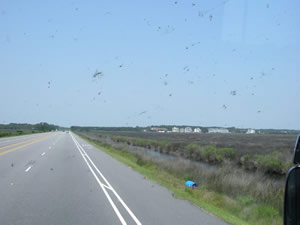 over to the venue for load-in.
over to the venue for load-in.
“The generator has a bad voltage regulator.” he notifies me “I’ll need to get a part to fix it or we won’t be able to use it today.” I set him up with a runner and he’s off to the auto parts store. A little while later we’re loading in and he returns with the new part and begins working on the bus on this sweltering 95° day. I know he must be exhausted by now as he’s just finished a long drive and now into mechanic duties, but you’d never know it as he continually projects a positive attitude. A little while later and the ‘genie’ is fixed, he empties the trash, does a quick vacuum of the front lounge, and is finally off to the hotel for sleep. As a tour manager, it is my duty to take care of the bus driver – to make sure he has whatever he needs – be it a ride, a meal, a quiet hotel room, etc. Even though he works like a machine, he is still human and gets tired like the rest of us.
While this story doesn’t contain the apparent drama of some of the more obvious ‘hell ride’ stories regarding bus travel, perhaps what is most interesting is what doesn’t happen. We don’t get tossed around like concrete in a cement mixer. We don’t get scared to death because we hear the rumble strip more often than we don’t. We’re not made to feel uncomfortable because the driver is socially inept. We don’t have to worry about not getting a good night sleep because we will. We don’t have to worry about any of these things because our driver is a consummate professional and a great guy.
The Nashville Musician’s Survival Guide contains several chapters pertaining to bus travel – including a chapter about bus drivers, and an extensive interview with one of the best in the business, a driver we are extremely fortunate to work with, Steve P. (Steve is such a great driver, that I am omitting his last name for the time being, in fear of him being stolen by another tour) The following excerpts were taken from that interview.
Steve P has been a professional tour bus driver since 1989 and has logged hundreds of thousands of miles driving some of the biggest names in rock, pop, and country to concert destinations throughout the US and Canada. Included in this list of touring artists and bands are: Hank Williams Jr., Rascal Flatts, Faith Hill, Rod Stewart, Dave Matthews, Jeff Beck, Creed, The Other Ones, Jimmy Buffett, and many more.
A native of Bowling Green, Kentucky, Steve is retired from full-time driving, now working as an ASE certified mechanic at the Nashville based Prevost bus shop as a team leader/shift supervisor. He still enjoys driving part time, going out on weekend runs regularly.
{Eric Normand} In the world of commercial driving many drivers including those who drive semis, delivery trucks, Greyhound buses, city buses, aspire to drive entertainment coaches. Why does everyone want to drive an entertainer coach?
{Steve P} I think they all think it’s a glamorous position to be out there on the road with some top name touring act, the draw of the prestige. It’s just the simple fact of driving a very nice entertainer bus that’s polished up and shiny. It just kind of draws them in.
{EN} What is different about how you approach driving an entertainer coach compared to these other types of commercial driving?
{SP} Well I’ve never driven a truck, but to drive a bus you just have to be smooth. Even though you’re sitting in front, you have to put your head in the back, to where the passengers are riding, and every move you make effects what’s going on back there. You can’t be hard on the brakes, rough on the in and out of parking lots. You can’t make sudden and drastic moves unless absolutely necessary.
{EN} Many of these other commercial drivers that aspire to drive entertainer coaches think they are qualified simply because they drive a large, heavy vehicle. In what ways are they not prepared?
{SP} Just sitting in the driver’s seat and driving a bus isn’t all of it. You have to be able to get along with the clients. Sometimes you’re a maid, sometimes you’re a babysitter, sometimes you’re a plumber, an electrician. Driving’s the easy part.
{EN} It’s no secret in the touring industry that good bus drivers are not only in demand, they are well paid. What is an average yearly income for a bus driver working on a busy tour?
{SP} You could easily make $100,000 a year. You could make as much as you want to be gone basically. If you don’t mind being gone year-round, you’re a single guy, no kids, and don’t mind being on the road, you can easily make 100 grand or more.
{EN} What do you love about being a bus driver?
{SP} Just the travel and the experience. To go all over the United States and Canada, I don’t think I would have gotten that opportunity with any other career that I would have chosen. And, meet some interesting people on the way.
{EN} What is one of the things you like least about being a bus driver?
{SP} It sounds contradictory but, being gone all the time. Yes, I enjoyed it, but when you’re on the road for six months, it gets old, especially after doing it for years and years. When you’ve been to the same town, and the same venues, and the same hotels again and again and again, it’s kind of like Groundhog Day.
As Steve mentioned, there is much more to this job than simply driving. While safety and delivering a smooth ride is of the utmost importance, keeping the bus relatively clean, keeping the fuel and water tanks full, addressing mechanical problems, even checking into hotel rooms, are common duties for tour bus driver. And of course, getting along with the clients and contributing to an overall “good vibe” is key. More from Steve later…
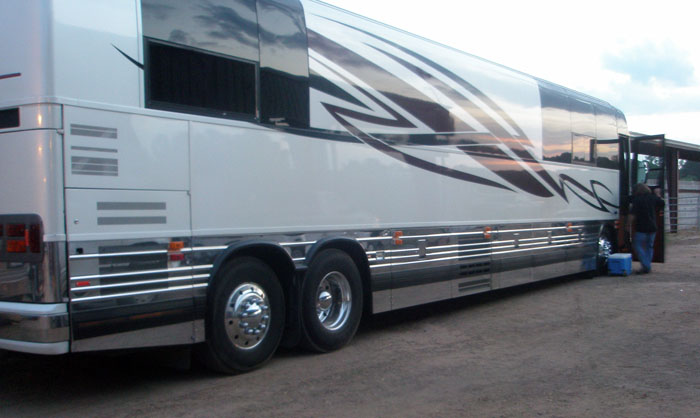
It was a warm Wednesday night in July of 2007 when the Rhett Akins tour left Nashville, Tennessee, bound for Macon, Georgia, on what would be a four city run across the deep South. The bus, a still shiny and new looking 2005 Prevost XLII, wreaked of personality, while the driver, Les, was somewhat reserved and looked a bit less than shiny and new. As is typical in the world of one-off bus leasing, this would be our first and only trip with this driver, and although he seemed to drive okay, we knew almost nothing about him. Well, over the next four days we would 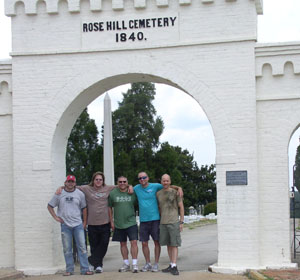 learn everything we needed to know about ‘Mr. personality’.
learn everything we needed to know about ‘Mr. personality’.
The six-hour ride to Macon was uneventful enough, and I didn’t even wake up when we pulled into the Ramada Inn parking lot. The rest of the day went pretty smoothly, and we even managed to fit in a visit to the infamous ‘Rose Hill Cemetary’, the Allman Brothers early stomping ground and eventual resting place of Duane Allman and Berry Oakley. Our show at the Cox Capitol Theatre later that night went well, after which we taxied the bus back to the hotel to sleep over as our next destination, Thomaston, Georgia, was only 50 miles away.
We left Macon at 11:00 AM on Friday morning for the one-hour trip to the small town of Thomaston, Georgia, eventually landing in front of ‘Q’s Downtown Grill and Music Hall’, and had a little down time between our arrival and load-in. Most of us were hanging in the front lounge when Les began his first in a series of rude and inconsiderate commentaries. “I was just offered an $85,000 a year driving job, but I think I’m going to turn it down” he boasted. “Why? That sounds like a great gig” one of us asked. “I usually make a lot more than that. Last year, I made $120,000” he continued in an annoying offhand manner. “What an asshole!” we all thought. We all knew that bus drivers make a ton of money but didn’t need to be reminded just how much more they make then the rest of us.
A short while later we sent Les off to his hotel room for sleep and went about our day. Rightafter load-in the wind picked up outside and it began to pour. Some severe weather had moved in and the power was knocked out for a while. We later learned that a tornado had touchdown a couple of miles away, but fortunately the weather passed, the power came back on, and we continued about our day. We played our show that night to a packed house, loaded out, and enjoyed some late night partying on the bus while we waited for our driver. As luck would have it, the runner was late picking up Les, who apparently had to wait in the hotel lobby for about 45 minutes. So by the time Les arrived back to the bus, he was somewhat agitated and had a hard time concealing this.
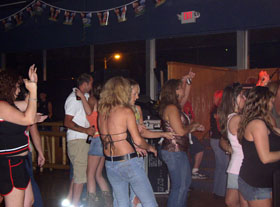 Sometime around 3 AM we began the 7 Hour drive to Augusta, Georgia, although now, the quality of the drive was noticeably rougher. Other than some hard braking at a few points, we assumed that the rough ride was just due to some poor road conditions across that part of the state. By the time we pulled into ‘The Country Club’, the happening nightspot in which we would be performing on this Friday night, a red carpet had been laid out for our arrival. Band and crew quickly attacked a huge platter of chicken fingers, shrimp cocktail, and a veggie plate that had been set out for us in the green room.
Sometime around 3 AM we began the 7 Hour drive to Augusta, Georgia, although now, the quality of the drive was noticeably rougher. Other than some hard braking at a few points, we assumed that the rough ride was just due to some poor road conditions across that part of the state. By the time we pulled into ‘The Country Club’, the happening nightspot in which we would be performing on this Friday night, a red carpet had been laid out for our arrival. Band and crew quickly attacked a huge platter of chicken fingers, shrimp cocktail, and a veggie plate that had been set out for us in the green room.
We sent Les off to his room, loaded in, and sound checked. This was of course followed by dinner, hotel time, and a blistering performance to a packed house of 1000 plus concertgoers and parties. The crowd was overly enthusiastic on this hot summer night and the party spilled out into the parking lot after the show. By the time Les returned around 2 AM the front lounge of the bus was full of nightclub patrons and in full ‘K-tel dance party’ mode. There was also 30 or 40 people hanging out in the parking lot near the bus, and this is where Les delivered his next uncanny remark. “Does Rhett party like this every night?” he said judgingly. “Every night’s different, sometimes we party a little bit, other times we’re tired and go to bed. Why do you care?” I answered, now annoyed with this would-be high school prom chaperone. “It just seems pretty irresponsible to me. Not a good way to run a business.” he grumbled.
About an hour later we set sail for Myrtle Beach, South Carolina, the final stop of this five legged bus ride that was getting rougher every minute. Apparently annoyed by our after show activities,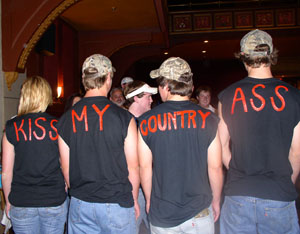 Les tossed us around pretty good for the five hour trip, perhaps as some sort of punishment for having “too much fun”. A lot of side to side sway, hard braking, you know, the kind of bus driver tendencies typical of a moron. We pulled into the parking lot of ‘The Boathouse’ which was the venue we would be playing, and this time I was instantly awoken as the bus jerked to a quick, hard stop. A little while later I sent Les off to his room at the adjacent Holiday Inn, notifying him that we planned to depart for home at 11 PM that night.
Les tossed us around pretty good for the five hour trip, perhaps as some sort of punishment for having “too much fun”. A lot of side to side sway, hard braking, you know, the kind of bus driver tendencies typical of a moron. We pulled into the parking lot of ‘The Boathouse’ which was the venue we would be playing, and this time I was instantly awoken as the bus jerked to a quick, hard stop. A little while later I sent Les off to his room at the adjacent Holiday Inn, notifying him that we planned to depart for home at 11 PM that night.
Saturday proved to be another great outing for Rhett and band, an outdoor summertime concert behind a nightclub on the banks of a river. Again, the day’s activities and concert went quite well, with the biggest drama being delivered by our wing-nut bus driver at the end of the night. Our show had ended at 9:30 and we were all hanging out inside the bar waiting for the 11:00 PM bus call. Around 10 of, I walked out to the bus to see if Les was ready. Upon opening the bus door I was astonished to see him sitting in the driver’s seat smoking a cigarette (In case you’ve never ridden on a tour bus, in general, this is a no-no). Smoking on our busses is only permitted while the bus is in motion, as this will allow the smoke to ventilate out an open window. I asked him to not smoke on the bus while not moving, and he reluctantly extinguished his cigarette.
I told him I would go get the rest of the guys and that we could leave shortly. Upon returning to the bar I quickly realized a couple of the guys must’ve gone over to the hotel, and called them to tell them we were ready to leave. When I returned to the parking lot I was dumbfounded to see the tail lights of our bus growing smaller in the distance as Les was apparently more than ready to be done with us. When I called him on my cell phone and asked “What are you doing?” he sarcastically answered “Are you ready to go yet?”. “Well yeah, I was just rounding up the guys. I told everyone were about to leave, and next thing I know I’ve got guys running after the bus across the parking lot carrying 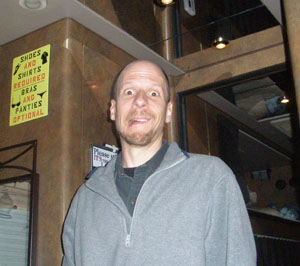 suitcases. What the hell are you doing?” “All right, I’m coming back now.” He said in a cocky tone of voice, almost as if this was some sort of weird game of bus driver/tour manager chicken.
suitcases. What the hell are you doing?” “All right, I’m coming back now.” He said in a cocky tone of voice, almost as if this was some sort of weird game of bus driver/tour manager chicken.
He brought the bus back, we hopped on, and took off down the highway, more than ready to be done with this jack-off. About an hour Into the drive, our drummer, Cliff, informed me that he had left his suitcase back at the hotel. I was horrified. I was already at a breaking point with this driver, and it seemed like he hated driving us. This is the last thing I wanted to do, but I had to do it. “Hey Les, I hate to tell you this, but Cliff left his luggage back at the hotel and we need to go back and get it.” After muttering some sort of offhand comment under his breath, he literally locked up the brakes, sending people flying as bottles fell off the counter and smashed on the floor. Again, I was dumbfounded. “What the hell you doing? He didn’t forget his bag on purpose. We want to be done with this trip just as badly as you do. Do you really think we want to spend an extra two hours on this bus with you?” I unleashed.
“Sorry about that. I didn’t mean to hit the brakes that hard.” he said. I then added “So far on this trip, each night your driving has gotten rougher and rougher. We don’t care about making good time on these trips, we want a smooth ride so we can sleep. Do you think you can lose the attitude just long enough for that to happen?”
With that, he turned around, went back for Cliff’s bag, and then began the 600 mile trip home two hours later, and for the second time. I guess the only satisfaction we got out of this was the knowledge that we made the final leg of the trip two hours longer than necessary for “les the mess’.
I’ve been on a lot of buses, with a lot of different drivers, but this particular trip was a first. Never, and I mean never, have I had a driver just drive a waiting tour bus off into the night without telling somebody. Never have I seen one smoke a cigarette in the driver’s seat while the bus was parked. Never have I had a driver question our organization, or our right to party after the show. But then again, never had I ever experienced the exceptional bus driving skills of ‘Les the wing-nut’.
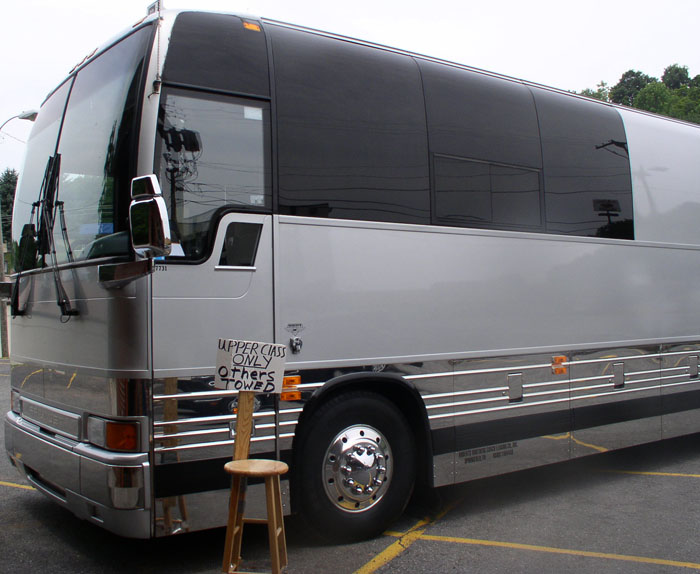
It was almost midnight on a Friday in late September, 2006 when I pulled up to the bus near Opryland in Nashville, TN. The Longbranch saloon in Raleigh, North Carolina would be the destination for Rhett Akins and band, and this ten hour – 540 mile trip would be a one-off. The driver, Ed, was sitting in the driver’s seat when I opened the door to enter the bus, and I immediately noticed a few peculiarities. To the right of his dash-mounted GPS was a little platform upon which sat a laptop, screen open and powered on. On the floor to his right was a large igloo cooler. On his head sat an oversized telephone headset (think AT&T operators of yesteryear) which was wired to a cell phone also mounted on the dash. “Hi, I’m Ed. Pleased to meet you” he said, and with this enthusiastic introduction I thought ‘Okay, I guess I’ll have to give this guy a chance, even though he looks like he’s wired for a moon landing.’
A short while later we were loaded up and headed east on interstate 40, and I went to my bunk to go to sleep. Now anybody that’s done this ride before knows that I40 through eastern Tennessee and North Carolina is a mountainous region, full of steep inclines and hard grades. ‘The gorge’ is one particularly harrowing mountain pass in the middle of this trip that requires some careful navigating, as do a few other spots. It was in these mountain passes where I first realized that Ed was a bit less than great when I awoke in my bunk with my face pressed up against the wall. I could hear the sounds of the diesel engine moaning loudly as he dug in hard up one incline after the next. I eventually fell back asleep but not without a few restless hours of wondering if he was going to drive the bus off of a cliff, as his bouts with the rumble strip occurred at regular intervals. The sway factor was also pretty intense, almost as if he was conducting experiments in weightlessness for NASA. I found out the next day that Cliff Thompson, our drummer, has slammed his head into the bathroom wall as a result of some rough braking during the night, and that a guitar had fallen out of junk bunk. Sometime midmorning I sleepily crawled out of my bunk feeling a bit like a tossed salad.
“Did you sleep well?” Ed unknowingly exclaimed as I entered the now stationary front lounge. “Actually, I didn’t, the ride was kind of rough. I could feel quite a bit of side to side sway in my bunk.” I said in the most neutral tone I could muster. “Yeah, I noticed that a little bit too. Maybe the suspension on this bus needs to be adjusted.” “Maybe you could just drive a little bit slower on the ride home” I requested and he agreed to try. By this point of my touring life I had already been on many bus rides with many different bus drivers, some great, some terrible, and many in between. From my experiences they all think they’re great, I mean let’s face it, nobody thinks they suck. So usually by the time you figure out your driver sucks you’re well into your trip, it’s too late to do anything about it, and criticizing him or her can go either way.
By noon we were loading into the club and I was sending Ed off to his hotel room to get some sleep. “Can you put me on the guest list for tonight?” he asked “I might come back a little early and catch the last part of the show.” “Sure” I answered to this more than typical request. We went about our day, sound checking, hotels, dinner, meet and greet, etc. We hit the stage at 11:00 PM to a packed house and nothing seemed too out of the ordinary until midway through our set when I spotted our driver line dancing with some locals on the dance floor. That was the only time I noticed him in the club during our show, but immediately afterwards our merch person told me that Ed had come up to the merch table with a girl under one arm, and alcohol on his breath. A little while later I was the first tour member onto the bus and was astonished to be greeted by Ed and some unknown floozy. “Great show!” He gleefully exclaimed as they stepped off the otherwise empty bus. Is this guy for real? You would think he was the one on tour.
We loaded our gear, climbed aboard, and settled in for another frightful trip through the gorge. I wasn’t alone in my distaste for this driver, as everyone else had commented throughout the day on the rough ride and his odd behavior. Right before we set out on the voyage home I made one more attempt at coercing a smoother ride from this brainless wonder, but a short while later it was obvious that he just plain sucked. Bobby Dancy, our bass player at the time, also suspected that we were in for another 10 hour hell ride and grabbed the unopened bottle of Crown Royal from the countertop. “This is the only thing that’s going to put me to sleep tonight.” and with that he took a big swig. “I agree. With this clown at the wheel we’re going to have to change the name of the tour to Bob Weaver and the Wanderers” and with that I took a swig. We all but killed off that bottle by four or five in the morning on this would-be roller coaster ride thru hell, at which point we each began slowly retreating to our bunks, wondering if this might be the last bus trip of our lives.
Amazingly, we did eventually pull back into Nashville and the boat-like motion finally came to an end. Aside from a nasty three-day hangover, the only thing that was damaged was Cliffs forehead (from hitting the bathroom wall), and the drivers pride from the ass reaming I unleashed on him just before I drove off. I learned later from Kelly, that at one point Scott had walked to the front of the bus to discover Ed surfing on match.com on his laptop while going 75 down the highway.
I don’t remember the name of the bus company we were using at this point, it was one of several $300 a day companies that disappointed us during this time. There’s no free lunch in this world, if you try to save money with buses, you’ll still pay in the end – whether through stress, lost sleep, breakdowns, whatever. Ultimately, it was a handful of bad experiences like this one that would lead us to the decision to switch to top shelf bus companies. Because if you try to skimp out, the money you save on busses, you will spend on whiskey instead.
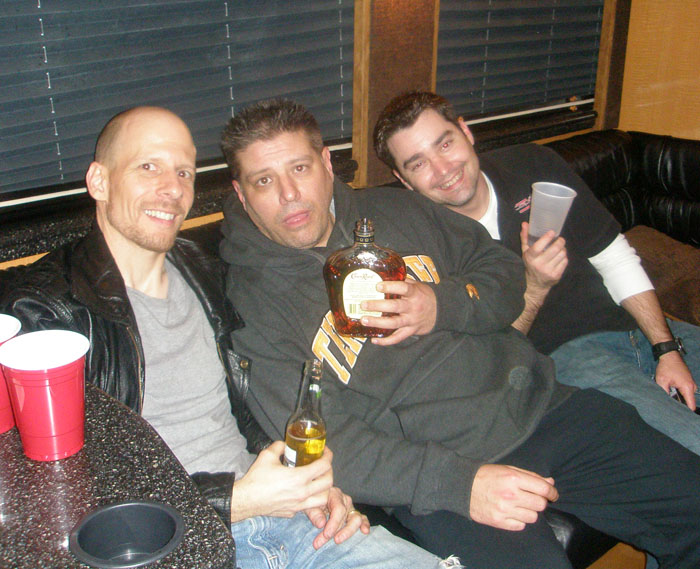
So you just moved to Nashville, you’re a good solid player with a good attitude and excited to begin working. You don’t care about being a superstar, you just want to play music with others but you are quickly learning that this can be hard to do. You are having a hard time getting off the ground. What do you have to do to get started in this town?
Regardless of your talent level, the truth is simply that talent alone isn’t going to get you work. Nashville, like any major music Metropolis, attracts talented people by the masses. They literally flock to this place in droves. This creates a supply and demand problem that works against the musicians. Knowing and understanding this is crucial. Ultimately, the only way in is by slowly nurturing relationships that will lead to opportunities. The best place to build these relationships is in the nightclubs around town. There is no shortcut to this, it’s going to take some time so be patient.
A newcomer to Nashville recently told me his story. He moved to Nashville about a year ago with the goal of becoming a part of the country music scene here. He has been frequenting the clubs downtown with the intention of sitting in and getting to know some of the players. Even though he’s familiar with most of the standards that are being played, he’s having a hard time getting past the idea of hustling to sit in. He said that he views his reasons for networking as self-serving, and this prevents him from talking to musicians because he feels self-conscious about it – like he’s using them. The end result is that he just walks around watching bands, never talks to anybody, and then goes home.
I, as well as many others, can relate. When I first moved to Nashville I was in a similar situation. How does one introduce them self to all these total strangers and maneuver his or her way into sitting in without coming off to self-serving?
One thing that worked for me was seeking out groups of players and artists that I related to musically. This makes it much easier to form real relationships that can evolve over time. Try to find a group of players, or singer that you really connect with. Maybe you really dig their song list, or are inspired by the performances of one or more of the players in the band. If you can feel a real connection through the music, it should be easy to engage in some genuine conversations – the music is your common ground. Find out when they’re playing again and become a regular. Over time they’ll gradually get to know you and sitting in will be part of a natural progression. Maybe try to cultivate a handful of different situations like this. Also, try to find these kinds of inspiring groups that are playing either earlier shifts and/or at the less popular bars. Those situations will be more laid back and might make it more likely for them to take breaks. And that combined with a smaller crowd in general will make it easier to engage in conversation.
The key to gigging in Nashville is relationships. It’s hard to force friendships and relationships to happen, they need to naturally evolve. You need to regularly put yourself in different kinds of situations where this can happen. It just takes time, persistence, and patience. Most importantly, be a good person. Of course being proficient on your axe will help to.
There is no guarantee that this approach will allow you to achieve the kind of success you envision. But for that matter, there are no guarantees in the music business, or life in general. So just suck it up, be in it for the long haul, and get out there and start pounding the pavement. Be friendly and outgoing and put your best foot forward. Talk to people. Take an interest in their careers and lives. Try to find some common ground and build relationships with players that you relate to. If you have already tried this and haven’t yielded much results, try harder.
That’s what it takes to get started in Nashville.
So you’re thinking about moving to Nashville. You’ve heard there’s a big music industry centered here and you want to work in it. You’re ready to relocate for the right opportunity and just posted a craigslist ad to notify the Nashville music community about your availability. What kind of opportunities exist here for you?
If you’re not already living here, then the answer is none. That doesn’t mean there aren’t any opportunities here for you, just that you need to live here if you want to be in the game. The most important thing to understand about the Nashville music industry is that it is very much community oriented. Most of the people earning a living from music in Nashville have been here for years, and many of these Nashville veterans have a long list of friends that are also working in the music business. When a tour needs to hire a new player, most band leaders want to hire someone they are familiar with and will start going down their list. They want to not only know that they are hiring a competent player, but one who is easy to get along with, someone that will fit into their touring “family”. In more cases than not, that player will either be someone they know personally, or who was referred by someone they know.
The same is true of the recording community as well. You’ve got to be proficient on your instrument, but you’ve also got to be someone that’s professional, easy to get along with and has already established these prerequisites. In most cases the session leader will hire others who are already established in the recording community and a part of that family.
For newcomers, this is the world you are entering and you can’t expect people to hire you before you’ve established this kind of reputation personally. Simply posting an ad from out-of-state with an audio link of your playing and your credentials doesn’t establish friendships and relationships. You need to be here. And you need to be here for a while (think in terms of years, not months) to establish the kind of relationships that might get you hired on a tour or recording session. You must invest yourself in the community, be a good person and work hard over a long period of time to establish your reputation. This is likely the case in any music community but holds especially true in Nashville where the supply far outweighs the demand.
The Internet can do a lot, and of course there are exceptions to every rule. I have met people online, be it message boards, craigslist, what have you, and some of these virtual connections have even led to real friendships and relationships. But in most of these cases, at least for me, any real friendship that might have started on the Internet only fully materialized after meeting the other party in the flesh, so to speak, or at least through telephone conversations.
Another way to look at it would be to compare it to becoming an actor in Hollywood. They’ve already got plenty of great actors that are out of work living right in Hollywood. Are they going to hire a stranger from an Internet ad that lives 2000 miles away? Probably not. They’re more than likely going to hire somebody that is already a part of that community first.
If you relocate to any city and invest yourself in the community, you will inevitably have many relationships and connections after 5, 10, 15 years or more. Nashville is no different. Shortcuts are simply not available for most of us.
So maybe a craigslist ad, or other Internet ad might work for some to make an initial introduction, or even to begin establishing some relationships. But if you truly want to be in the game, you should at least be present at the game.
The Nashville Musician’s Survival Guide is meant to help musicians, songwriters, artists, and everyone that moves to Nashville for a career in the music business find their way. I have done  my best to describe in words what it’s like to live and work in this town. But words can only go so far. If you’re already here and working at your career in music, you’ve got a pretty good idea about the landscape. But for those that are considering relocating to Music City, the book, and the website, will contain as many photos as possible, to help give a taste of the town.
my best to describe in words what it’s like to live and work in this town. But words can only go so far. If you’re already here and working at your career in music, you’ve got a pretty good idea about the landscape. But for those that are considering relocating to Music City, the book, and the website, will contain as many photos as possible, to help give a taste of the town.
So this morning I drove into the city with my digital camera and tripod to try to capture some of the “uniqueness” this place has to offer. I parked in the big parking lot across from the Tin Roof on Demonbreaun, just a few hundred feet from the ‘roundabout’ at the beginning of Music Row, and set out on foot. The first photos I shot were of the controversial statue that sits right in the middle of the roundabout. I remember  the public outcry when this statue of naked people making music and dance was first built. Honestly, I don’t see what the big deal was all about. The way I see it, the statute is elegant and tasteful and represents the musical melting pot of this city.
the public outcry when this statue of naked people making music and dance was first built. Honestly, I don’t see what the big deal was all about. The way I see it, the statute is elegant and tasteful and represents the musical melting pot of this city.
Next it was on to the BMI building, a massive piece of architectural wonderment that I find to be both awe-inspiring and menacing, kind of like the music business itself. On the other side of the roundabout circle, there’s a statue I had never noticed before, that of a man sitting at a piano in Owen Bradley Park. Right around the corner is BMI’s little brother, the ASCAP building, which sits right at the beginning of ‘The Row ‘. After snapping some photos of these obvious landmarks during this now sweltering 90° morning, I walked a little further down 17th grand, one of the two one-way streets that comprise Music Row.
I’ve driven on these streets hundreds of times over the years, passing by the studios, publishers, and innumerable brick buildings that house the core of the Nashville music business community. But on this day, by foot, everything looked brand-new again, and this  gave me the feeling of the mysterious city that this was for me upon my arrival eight years ago. As I slowly walked down the long lonesome sidewalk of 17th Avenue, I realized how much of this city, this place, I had never really seen. As I stood on the curb staring curiously at these historic and iconic landmarks, I began to perceive Nashville like a newcomer again. I became curious about what was around each corner, about what was going on behind the doors of these buildings built upon music enterprise.
gave me the feeling of the mysterious city that this was for me upon my arrival eight years ago. As I slowly walked down the long lonesome sidewalk of 17th Avenue, I realized how much of this city, this place, I had never really seen. As I stood on the curb staring curiously at these historic and iconic landmarks, I began to perceive Nashville like a newcomer again. I became curious about what was around each corner, about what was going on behind the doors of these buildings built upon music enterprise.
A car pulled up to Curb Records and out popped a well-dressed woman carrying a briefcase. An older gentleman in a leisure suit exits the Sony building talking on a cell phone. A young man carrying a guitar case disappears down an alley next to one of the recording studios. Where are they going? What are they all doing? This hot morning stroll was putting me in the kind of mindset I was  in when I first came to town, curious and full of questions, searching for enlightenment. After working in the Nashville music industry for eight years, I rarely go out exploring anymore, as I tend to go to specific places of business as required.
in when I first came to town, curious and full of questions, searching for enlightenment. After working in the Nashville music industry for eight years, I rarely go out exploring anymore, as I tend to go to specific places of business as required.
About an hour after this photographic journey began, I returned to my car, as the heat was getting to be unbearable. I took lots of photos, but realized there’s so much more here to capture. I plan to go out and do this again several more times before I am done with this project.
So for everyone that is new to town, or thinking about moving here, hopefully, these photos will give you a little taste of Nashville. I hope you enjoyed the tour.

What is a fair price for our services as musical entertainers of the world? This is highly subjective, but in general, most musicians are underpaid.
My career as a professional musician began in New England, where I played the nightclub circuit from 1989 to 2002. When I first started out I made $300 per week salary in a top 40 band called Crossfire. We played about three nights a week on average, 50 weeks a year so I was basically making $100 a night. I left Crossfire in 1992 to join one of the first incarnations of a new local band, Jet City. The early version of this band was a bit disorganized, and we had literally no draw, rendering our pay to about $30-$50 per player per night. Shortly after this I started the cover rock band Shockwave, and we began playing around southern New Hampshire and the Merrimack Valley for similar wages initially. By the peak of that band’s popularity in the mid-to-late 90s we could draw 50 to 100 friends and followers nightly, plus whatever local following the bar already had. This got our nightly fee up to between $700 and $1000. We had our own production, a sound engineer and lighting designer, and each earned between $100 and $125 nightly. By the year 2000, Shockwave was dismantling and I started a three-piece blues rock band, and my nightly average went down to about $75 to $80.
In 2002 I relocated to Nashville and quickly learned that in-town nightclub gigs that guarantee a hundred dollars per player per night are few and far between. There’s a handful of gigs that might pay that, but for the most part, clubs pay a base pay of $20-$50 per player plus tips, and if you can draw 50 people it won’t necessarily get you any extra money. If your gig is in a tourist hotspot, and you play the right songs and work the crowd correctly, you can make $100 a night, sometimes even more. In those same scenarios you could also make $40 or $50 depending on the circumstances of a given night. This is why so many players in Nashville work towards landing touring gigs as a tour will pay you a considerably higher wage (usually $250 per show day or higher).
In recent conversations with friends back in New England, I learned that a hundred dollars per player per night is still somewhat of an average wage. It’s a sad state of affairs, but the truth is that musicians are a commodity, and we are working in a world of supply and demand where the supply far outweighs the demand. In this day and age if you’re getting $100 per night to go out and play music locally, that’s pretty decent money for us musicians. It’s just sad that when you factor in the cost of living increases and inflation, $100 in 2010 is considerably less than $100 was in 1989. I was, however, encouraged to also learn that in the New England club scene today, having a strong following, or possessing the ability to create strong sales at the cash register can still help bands to command a little better money. I guess in reality, that’s how this whole base pay plus tips thing works as well. Build a crowd and get them dancing and drinking, if they like you they will tip = earn more money.
If you play in a band and have reached a pay ceiling in your region, the “base pay plus tips” concept might be worth trying in a club or two. The way this works in Nashville is that clubs guarantee a minimum base pay of typically $200 to $300 per band per night, they don’t have a cover charge, and a tip jar is placed on the front of the stage. The lead singer will make an announcement, usually near the end of each set, that the jar will be coming around, at which point a friend or band girl friend will walk the tip jar around the room, stopping at each table or patron for tips. Not everyone will tip, but many will. The better the party you have going on, the better the tips will be. You can also use the tipping concept to joke around with the crowd. For instance, when somebody requests Sweet Home Alabama or Mustang Sally, you respond by saying “That song is usually at least a $20 tip.”
The reality is that it’s simply hard to earn a decent wage as a musician. So ask your price, take the gigs you find acceptable, and try to make it fun, because it doesn’t look like we were meant to get rich doing this.
